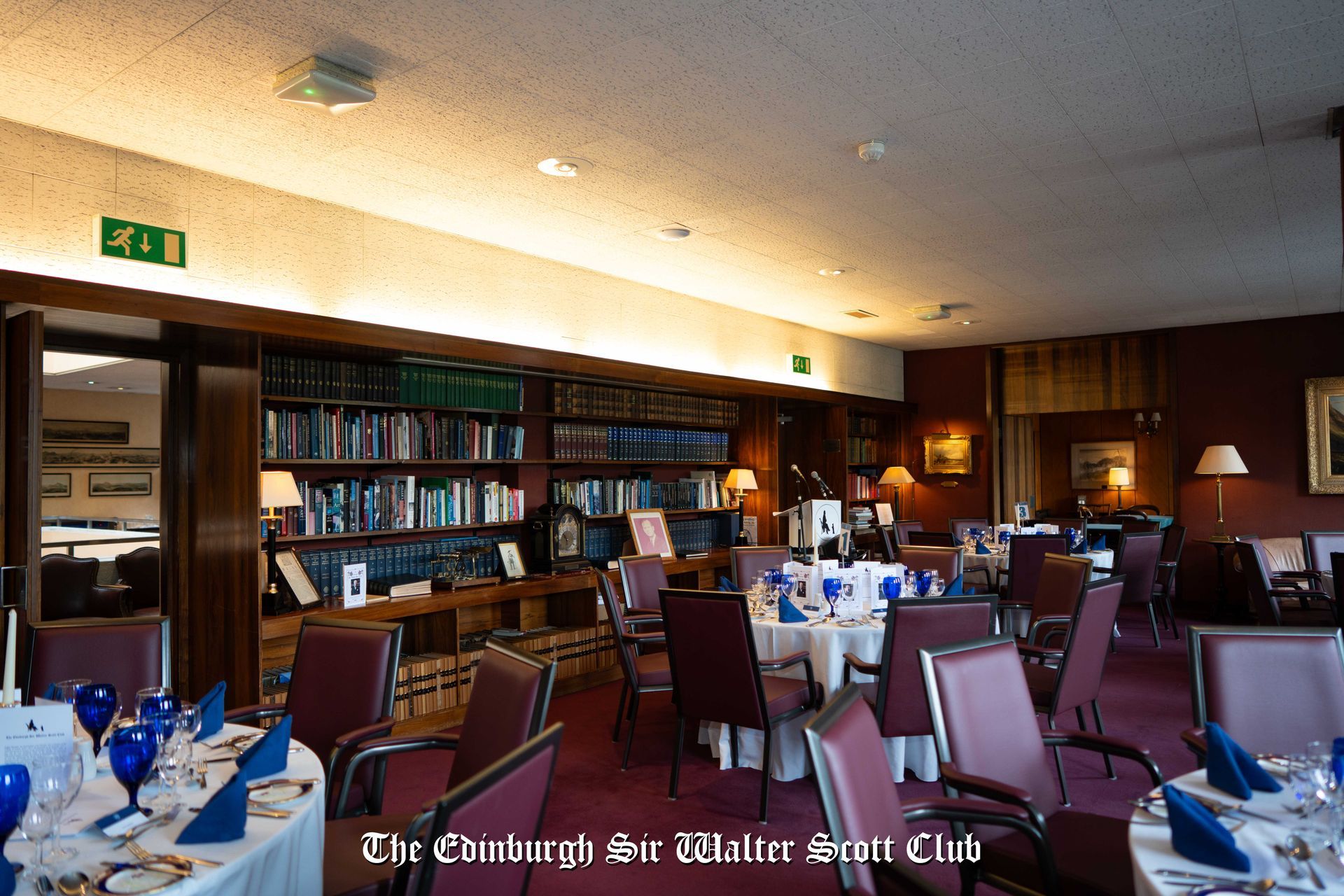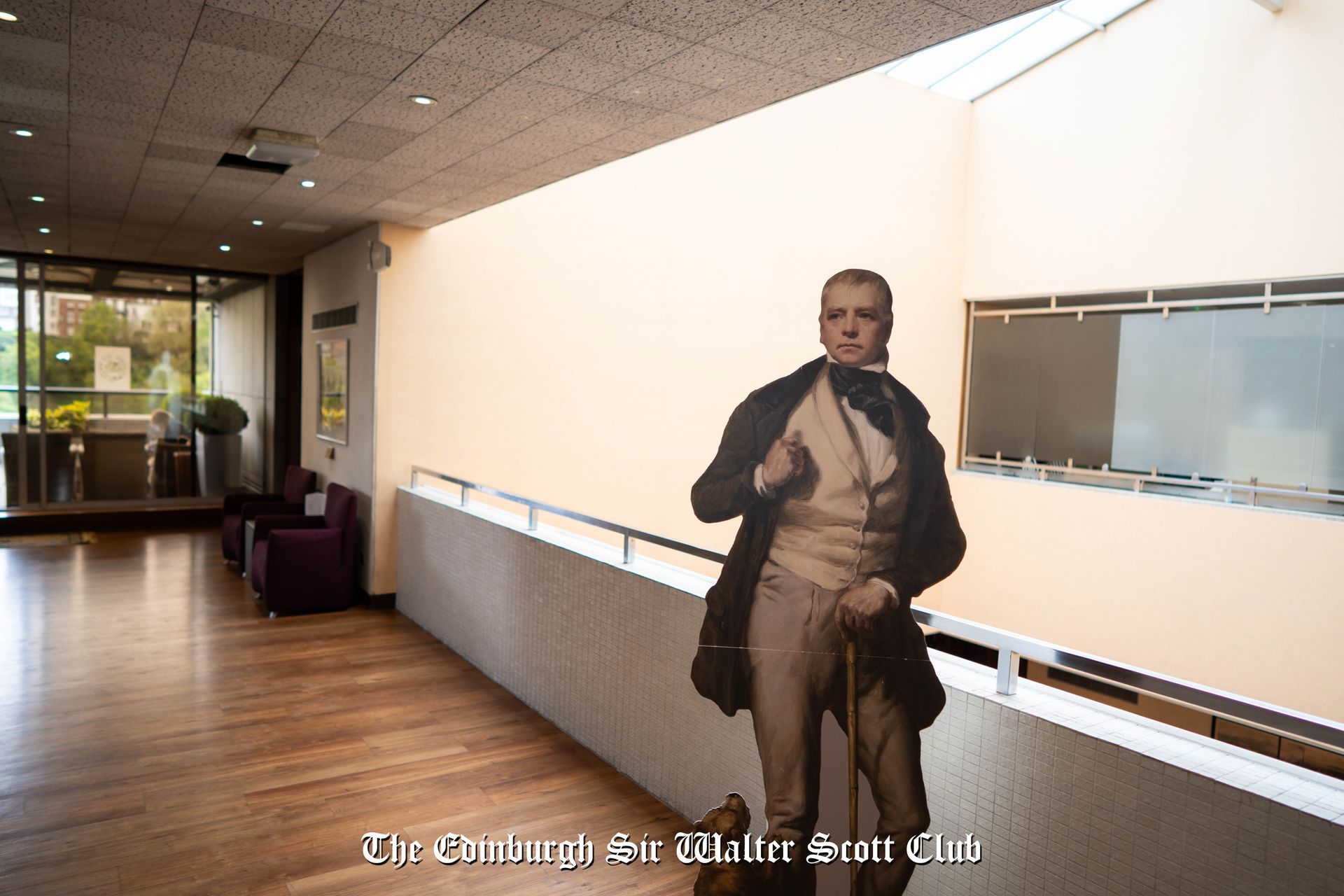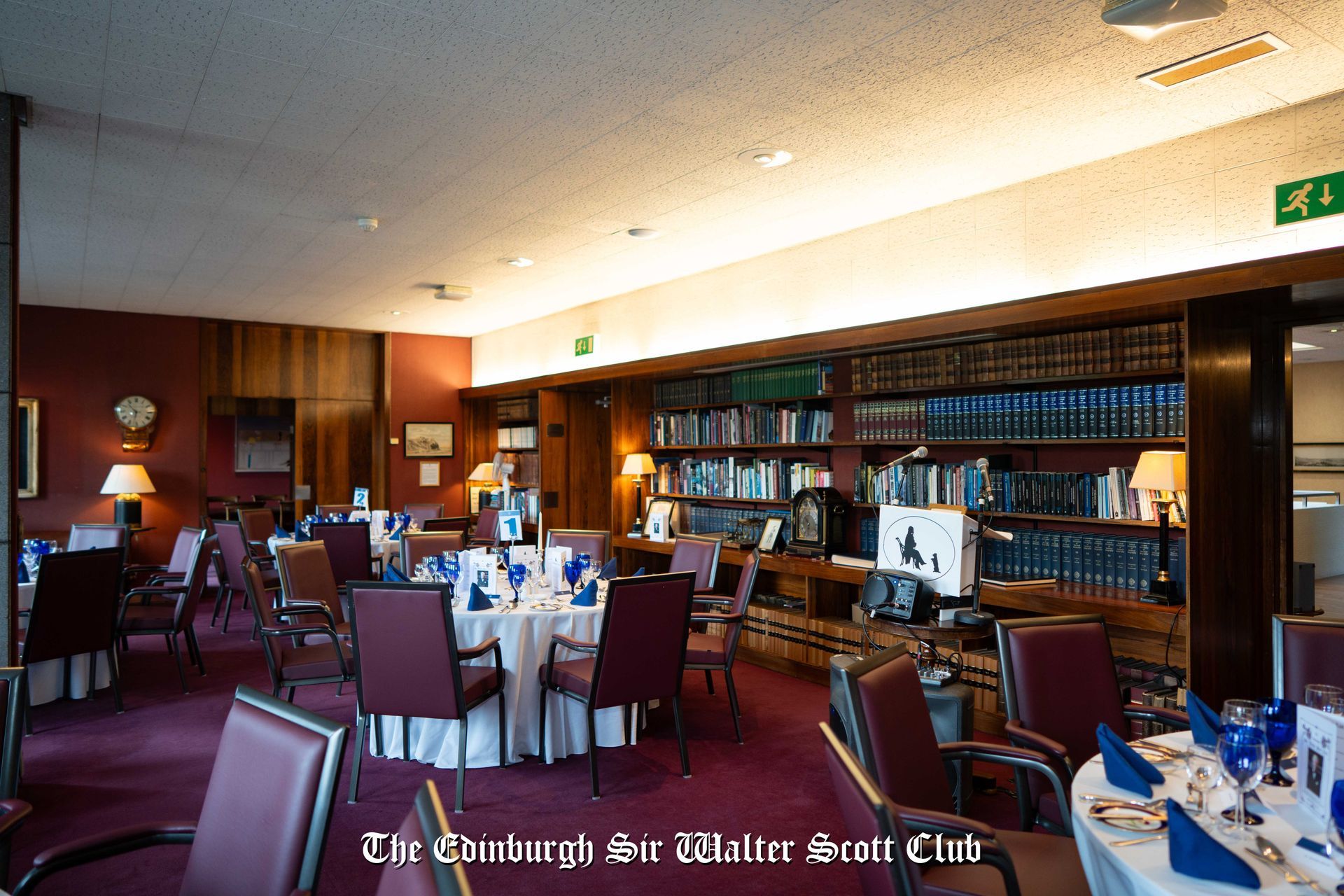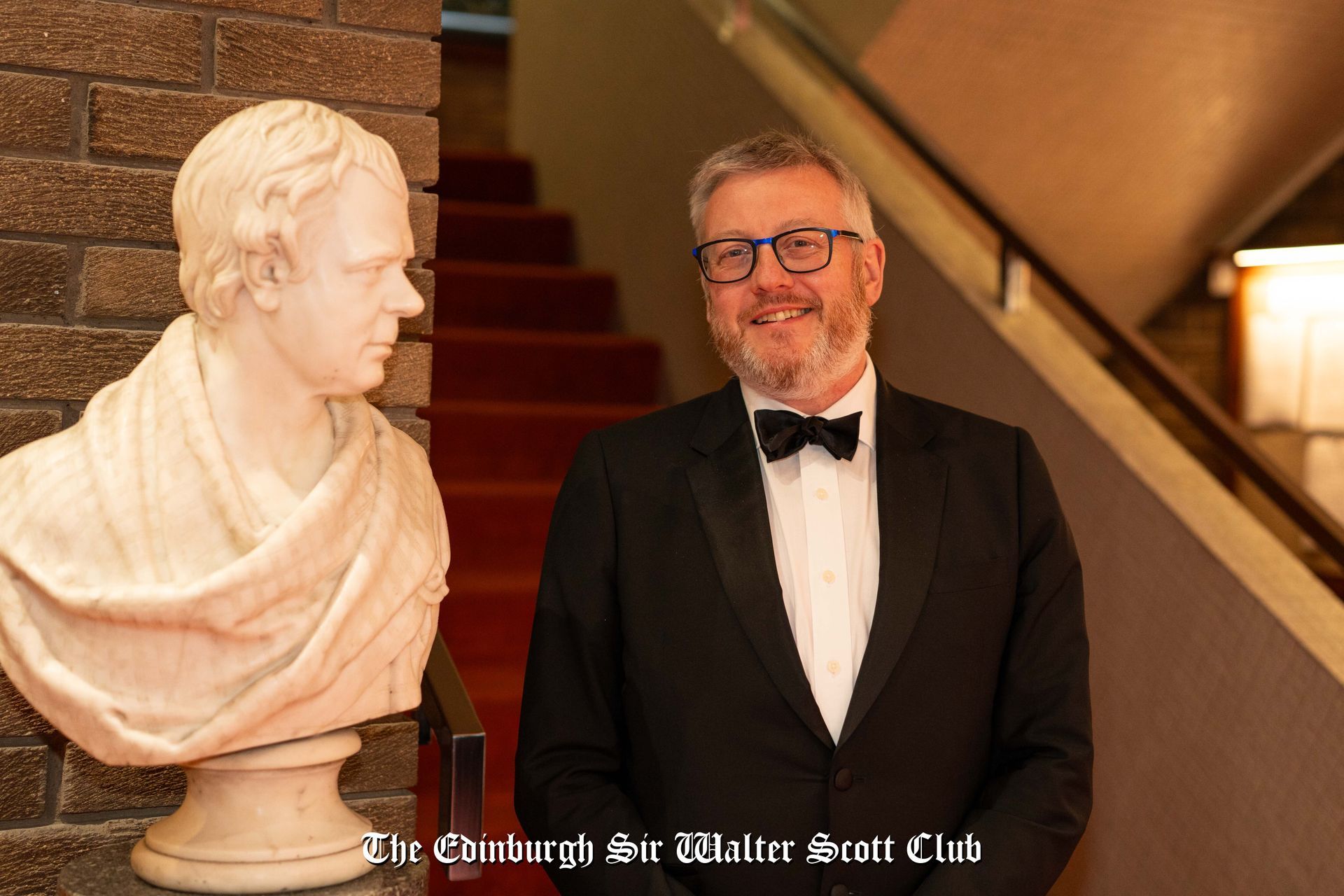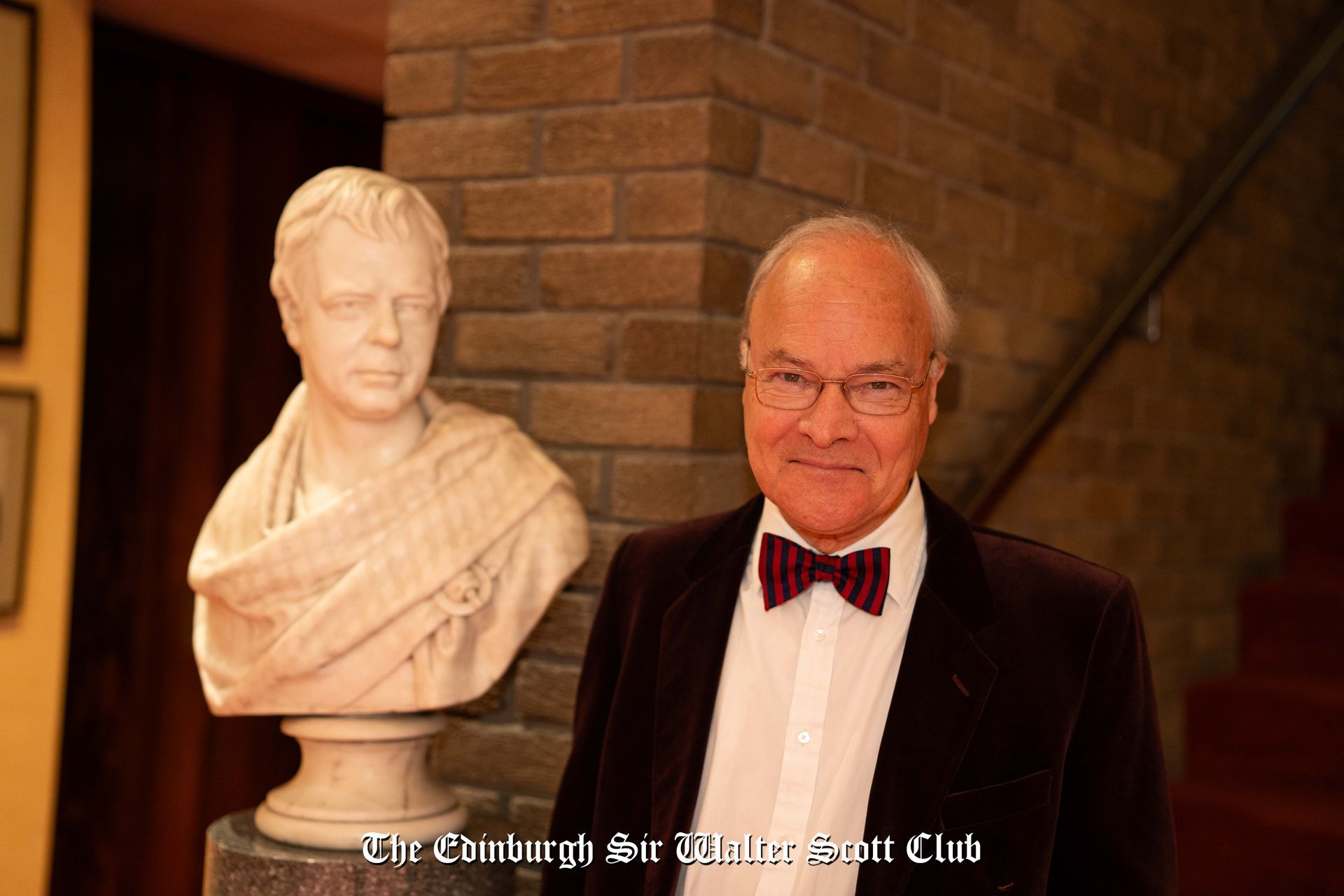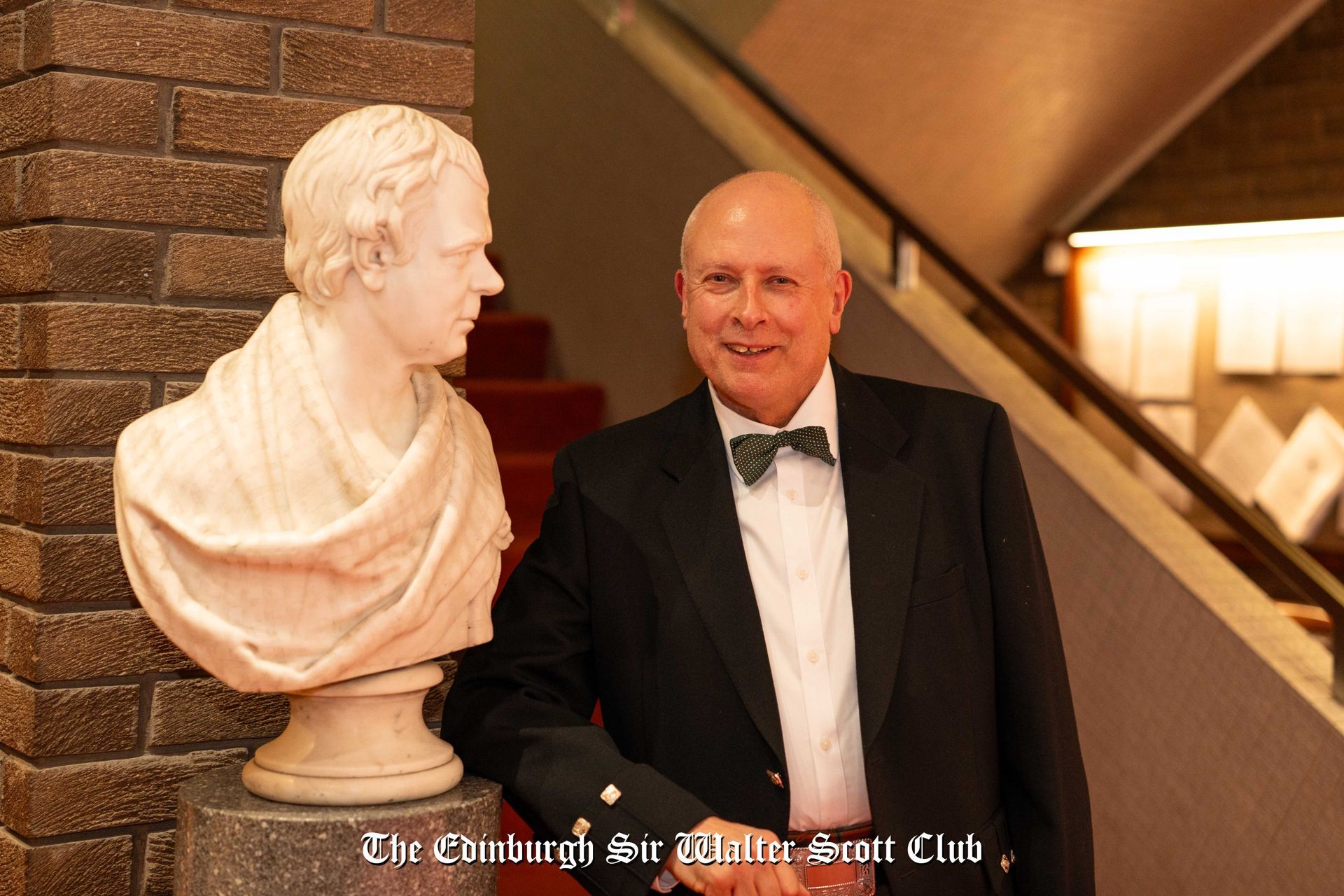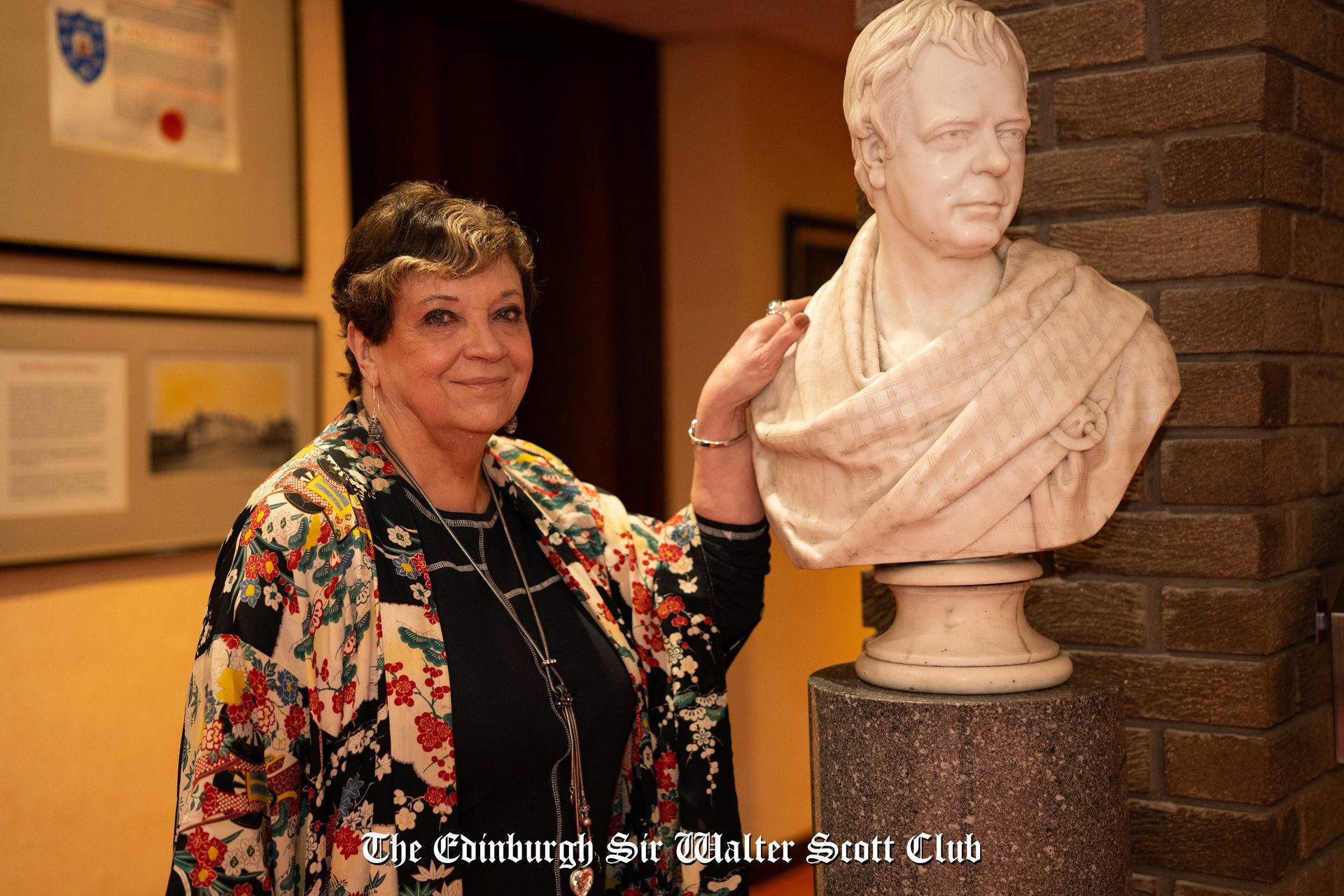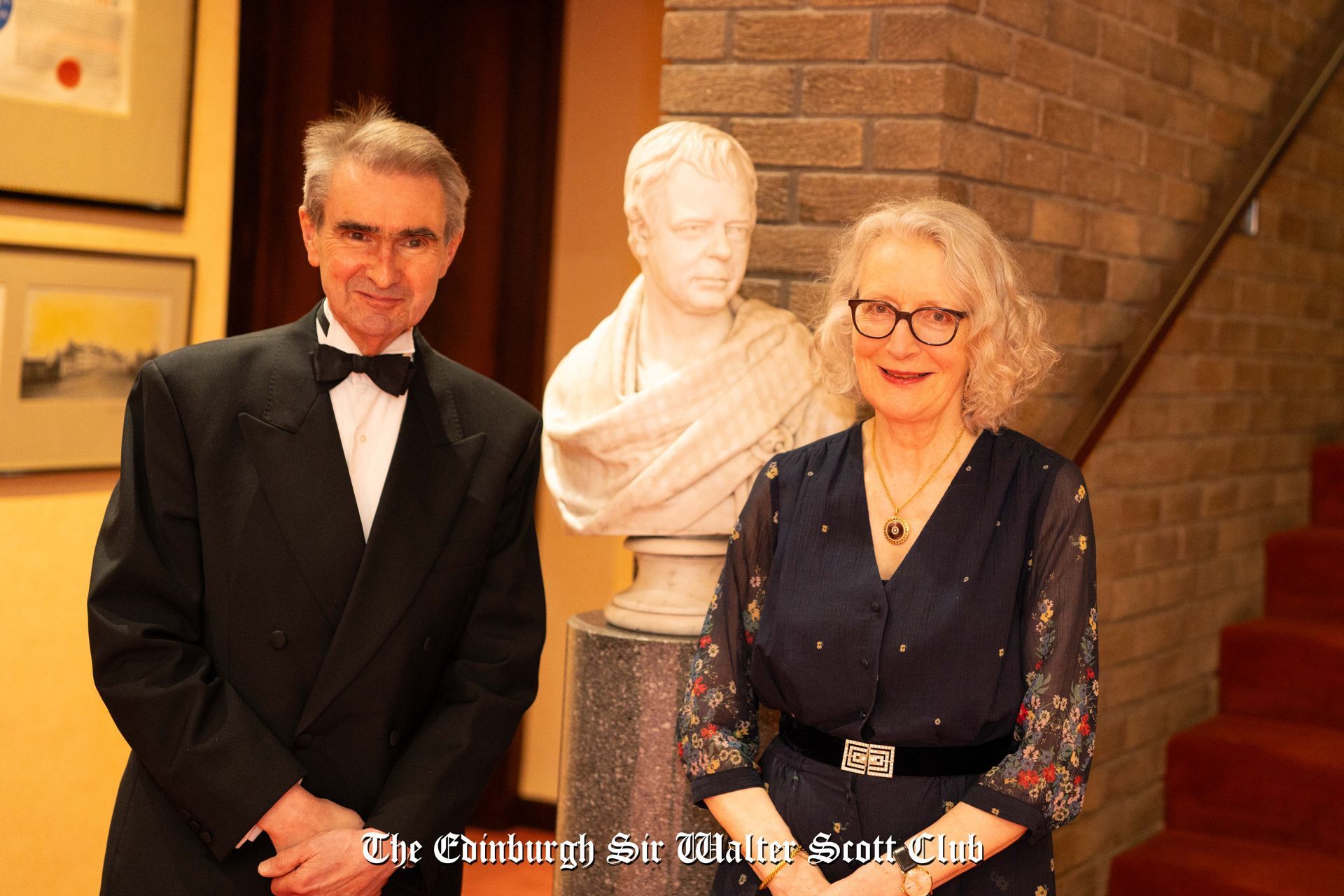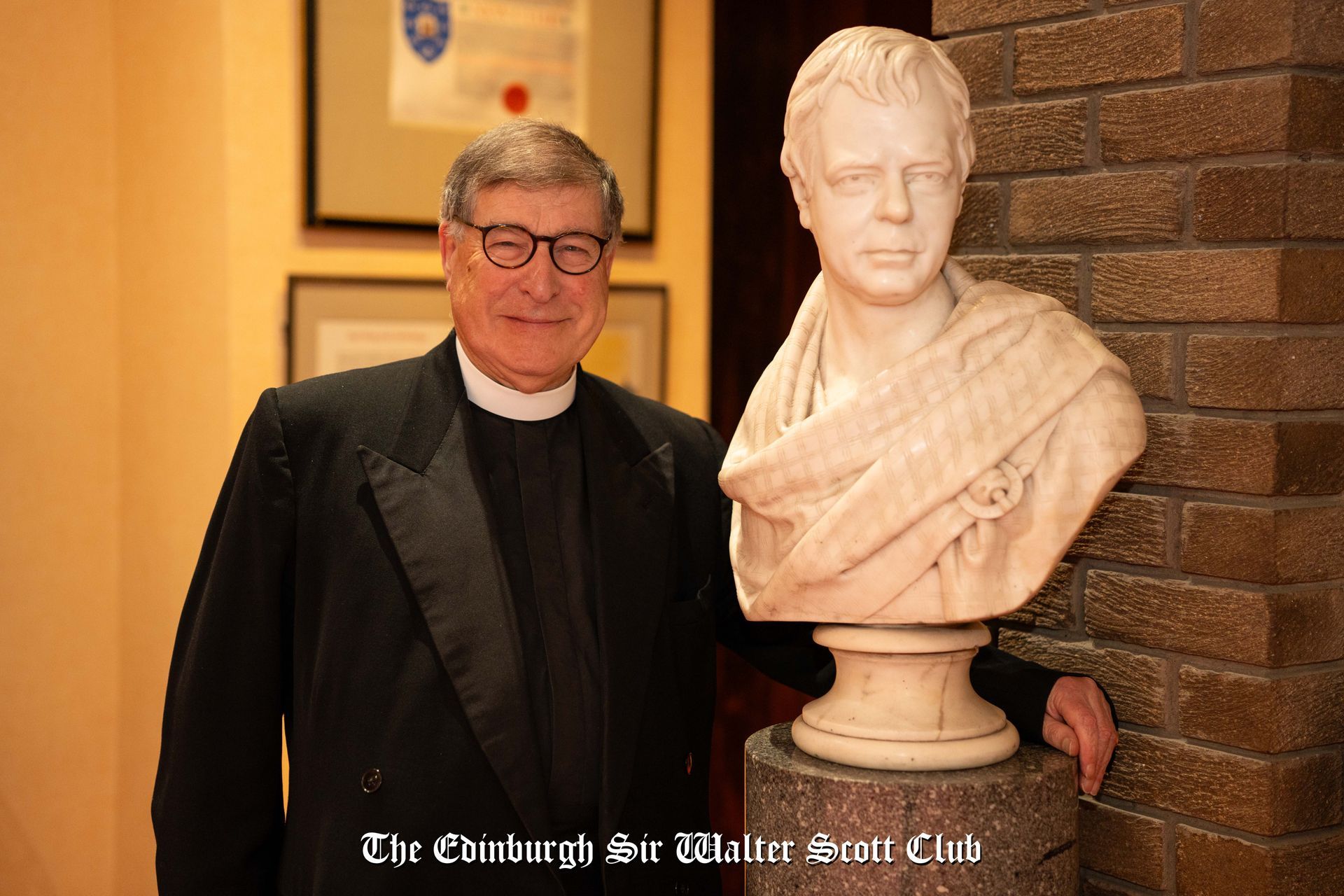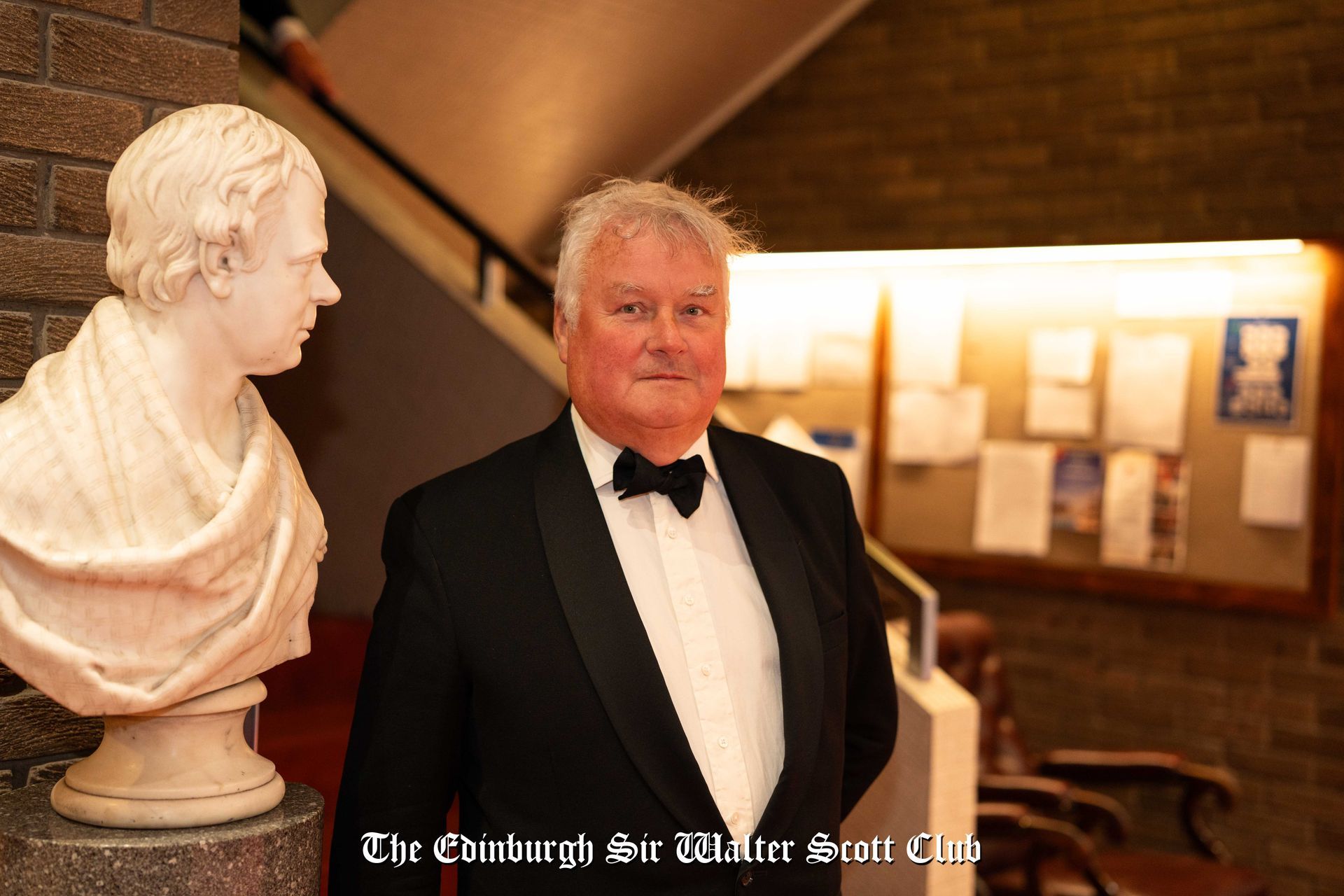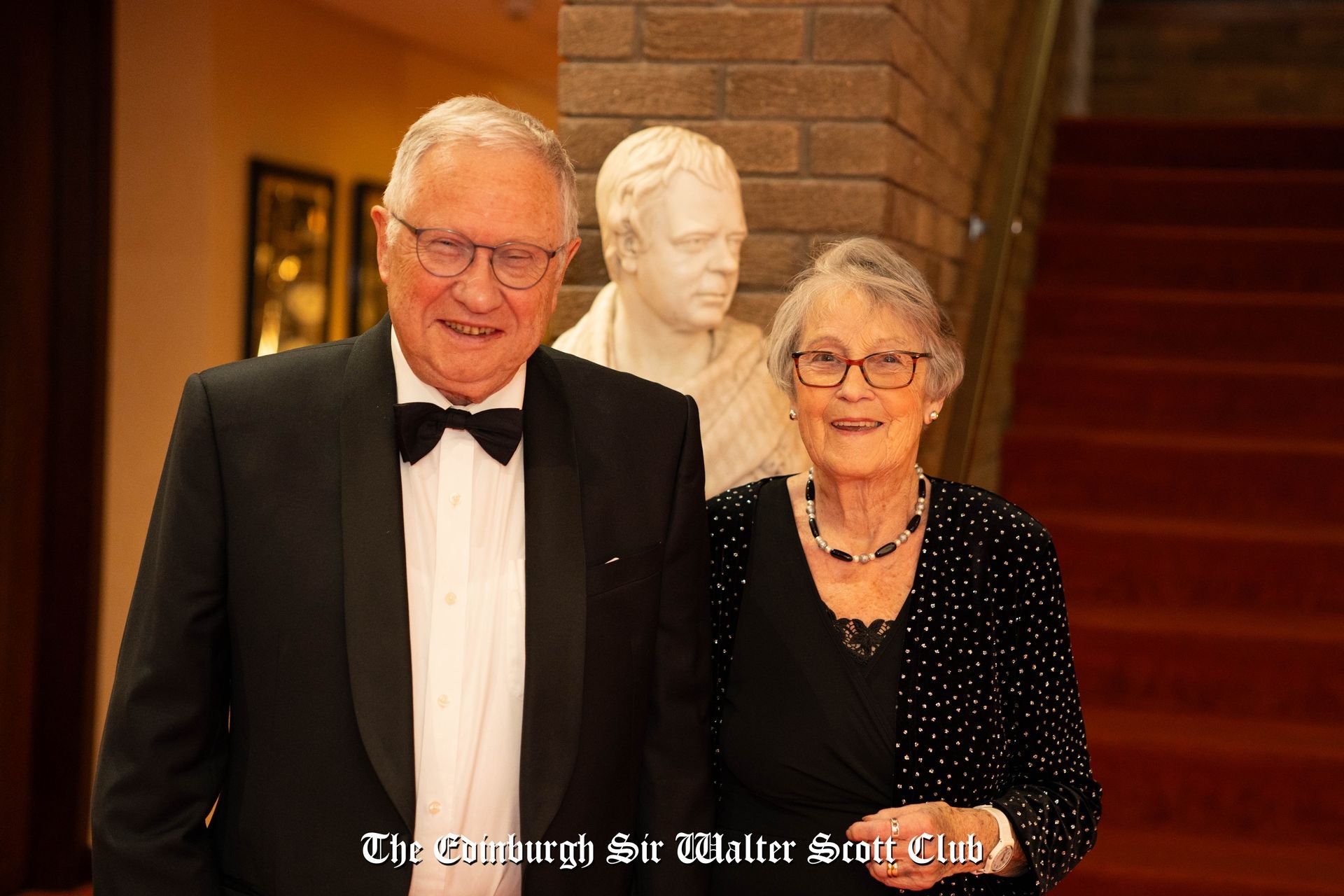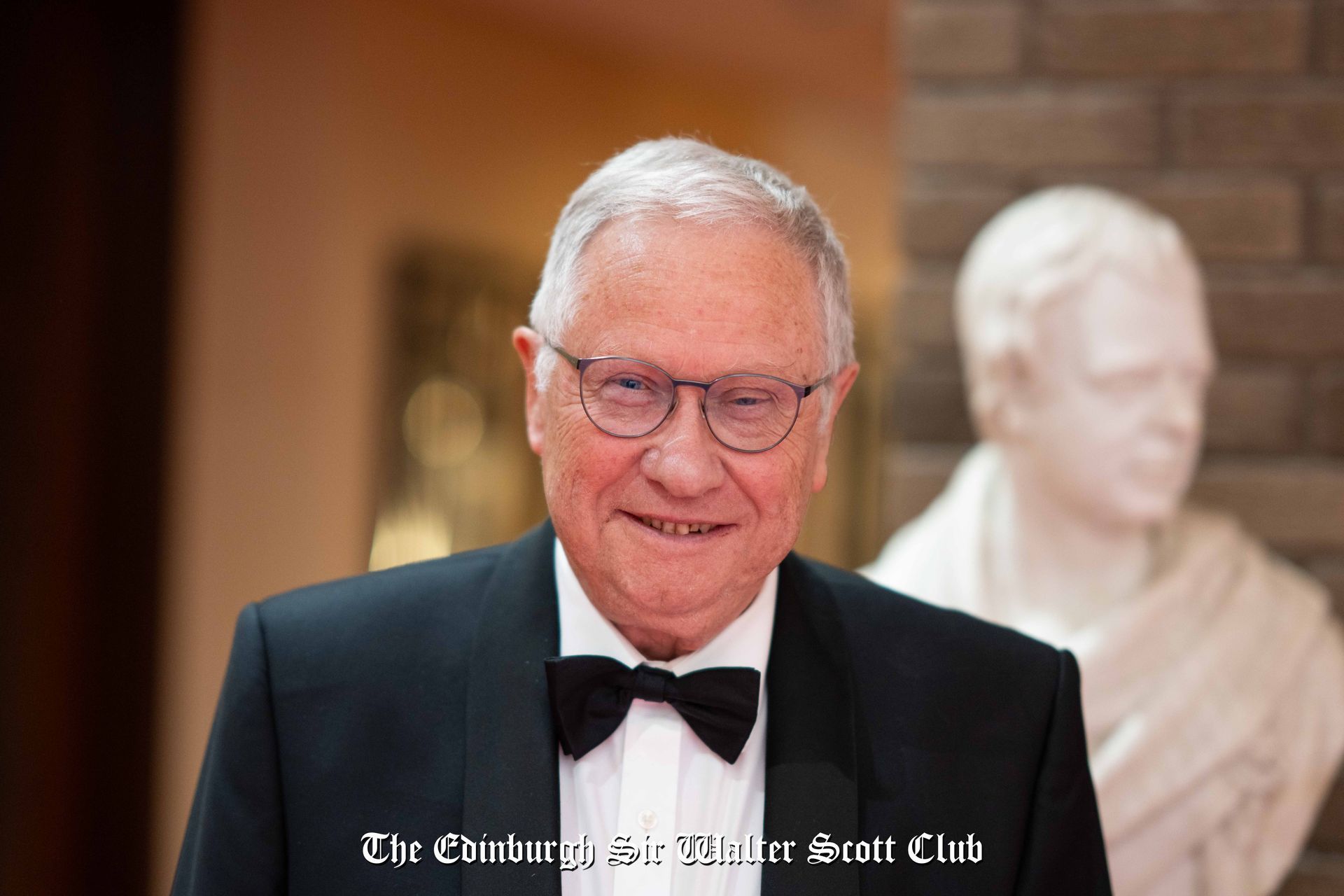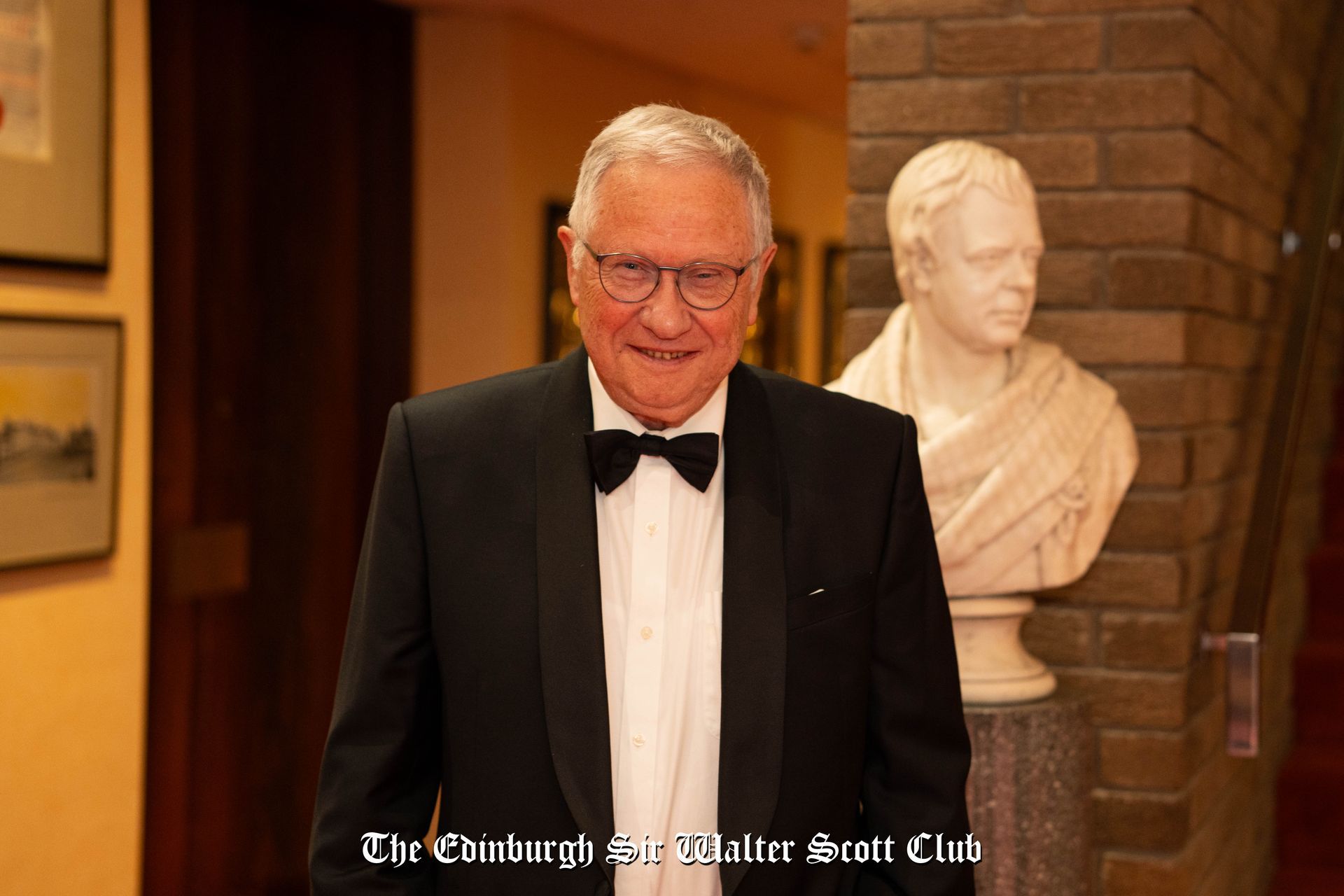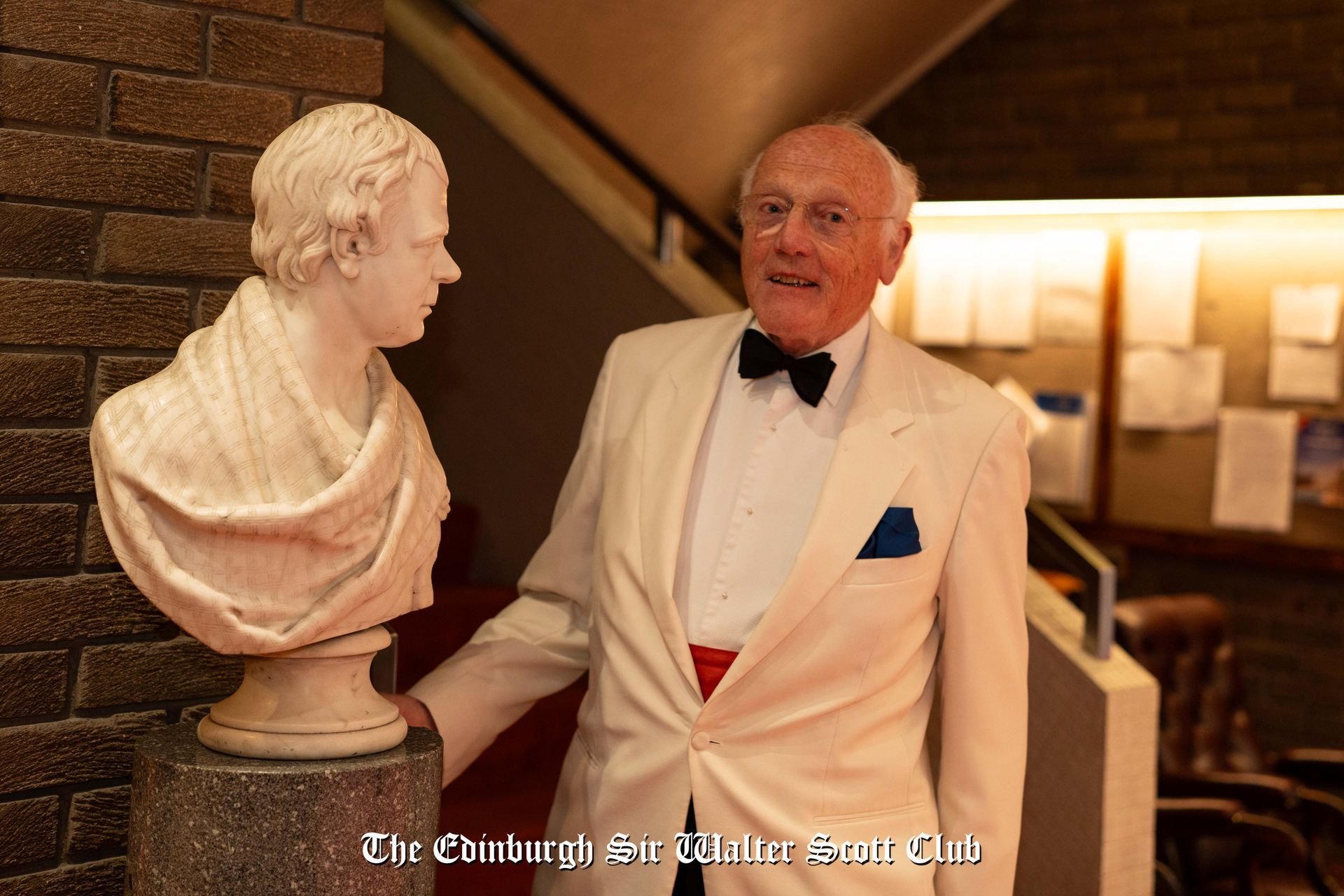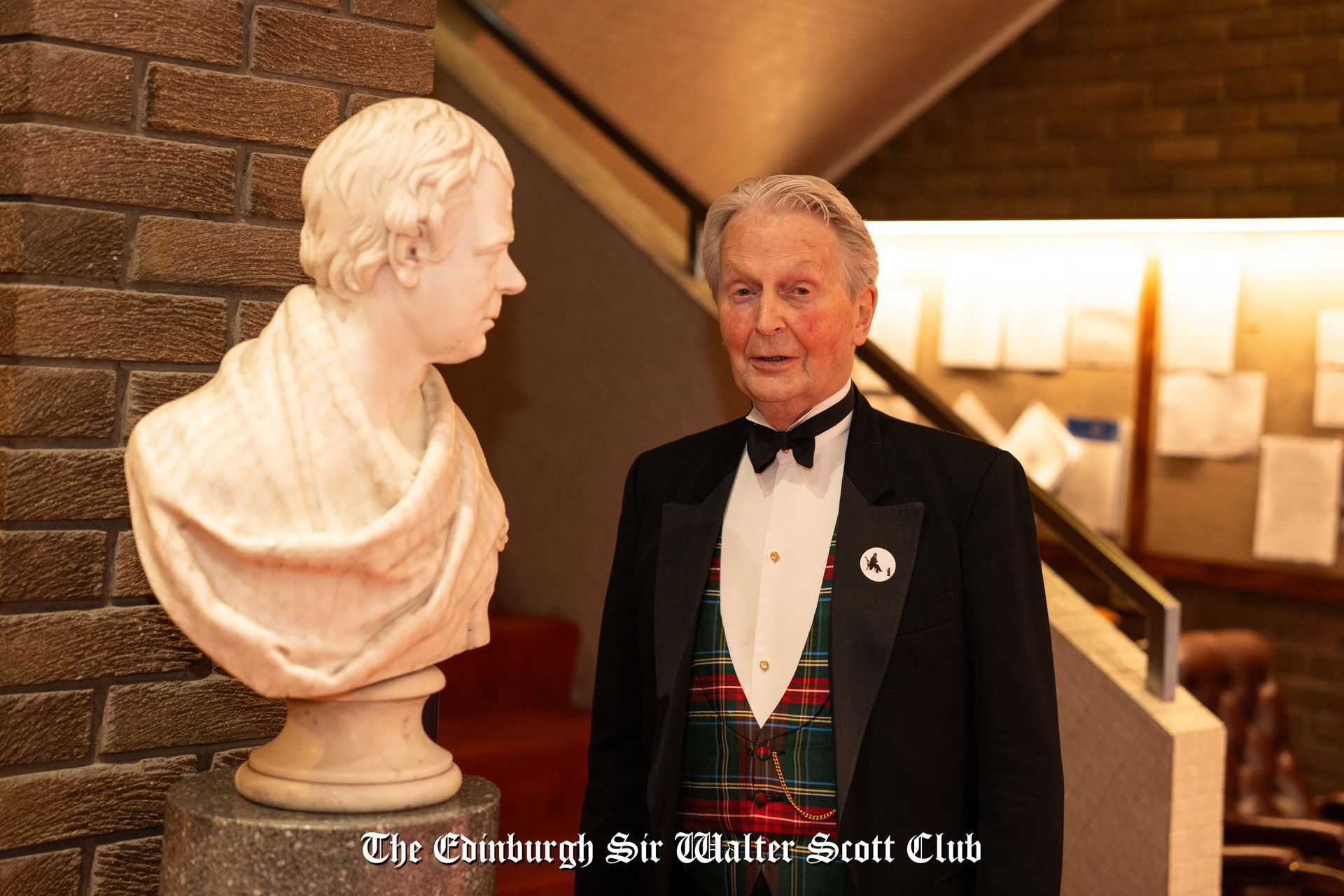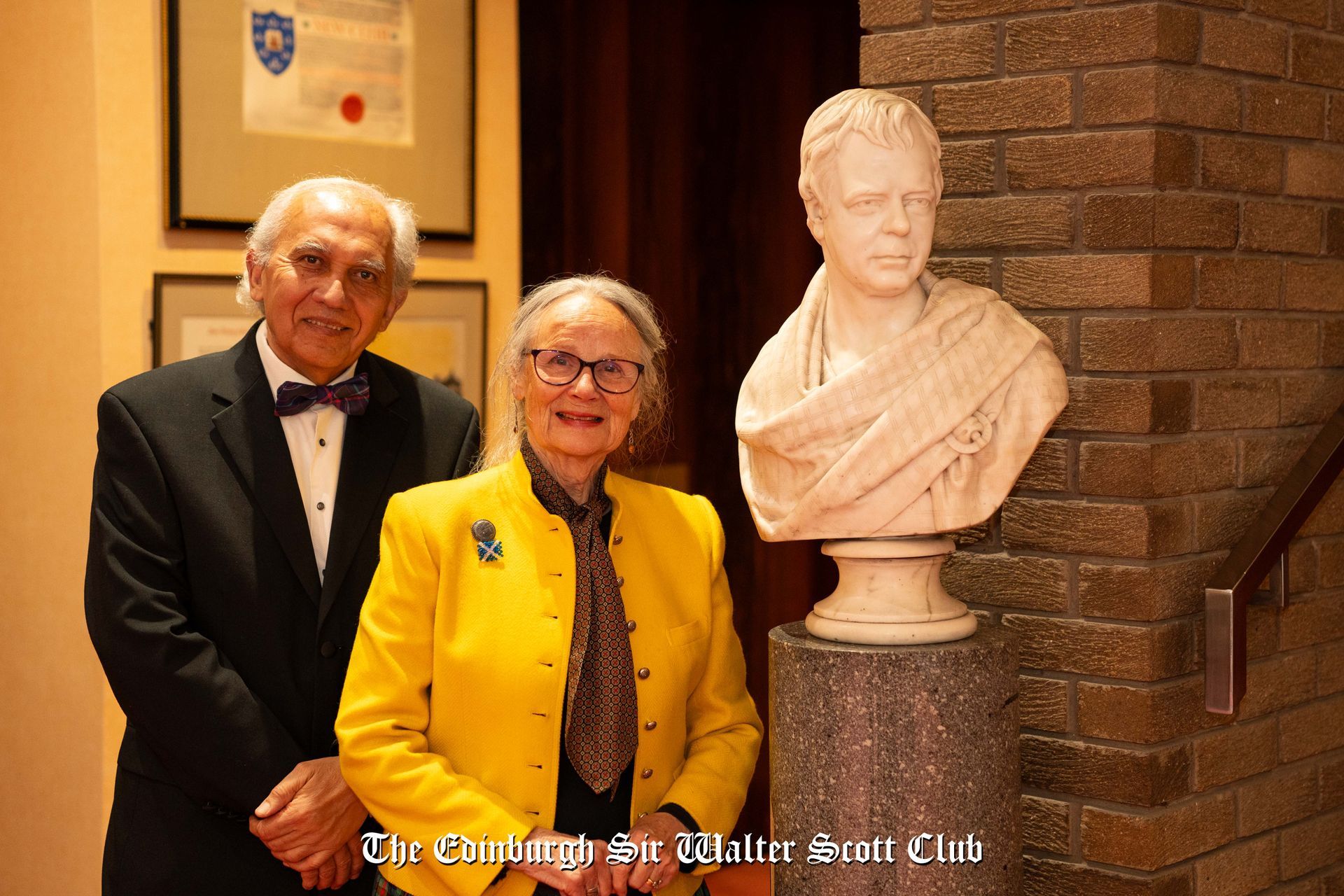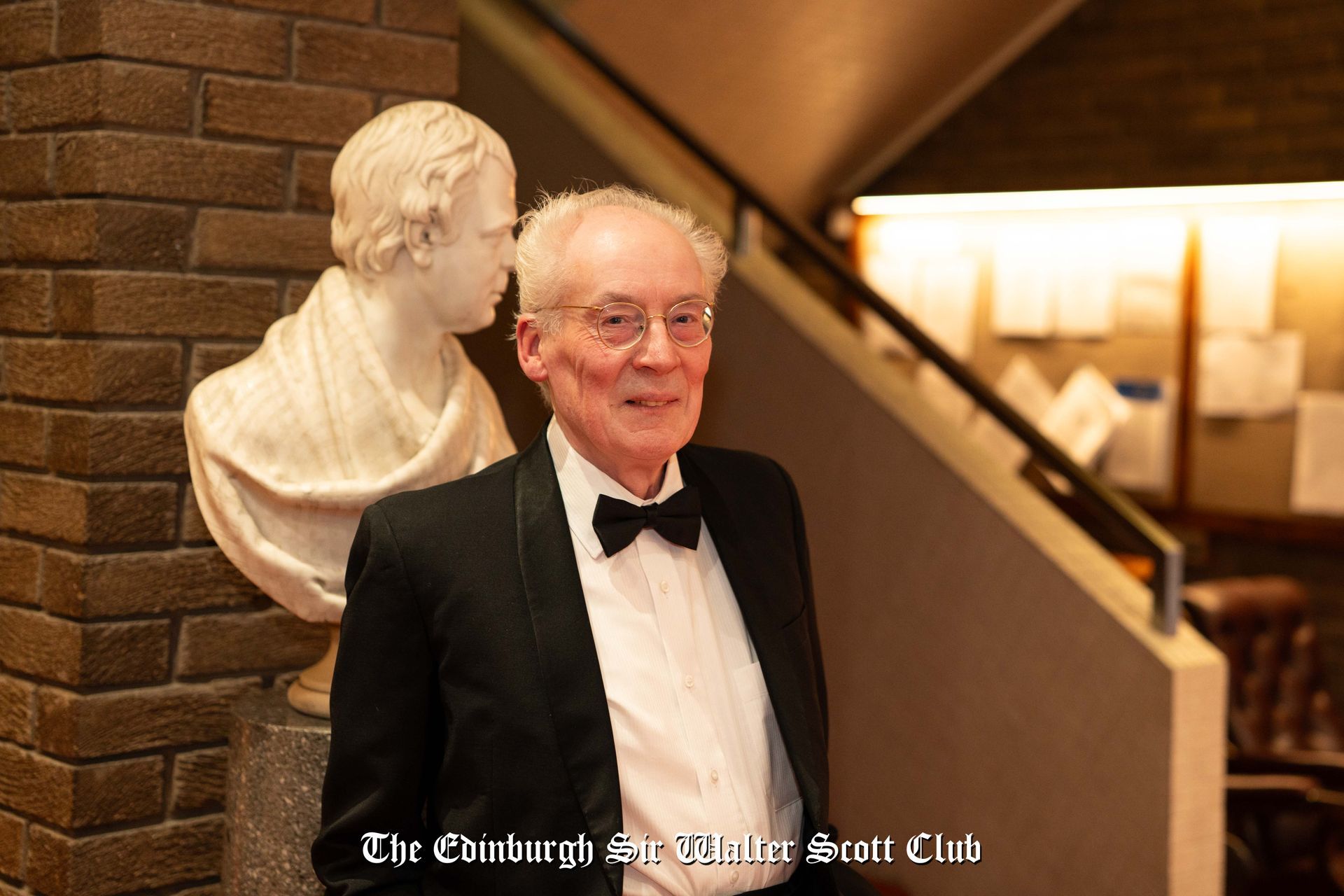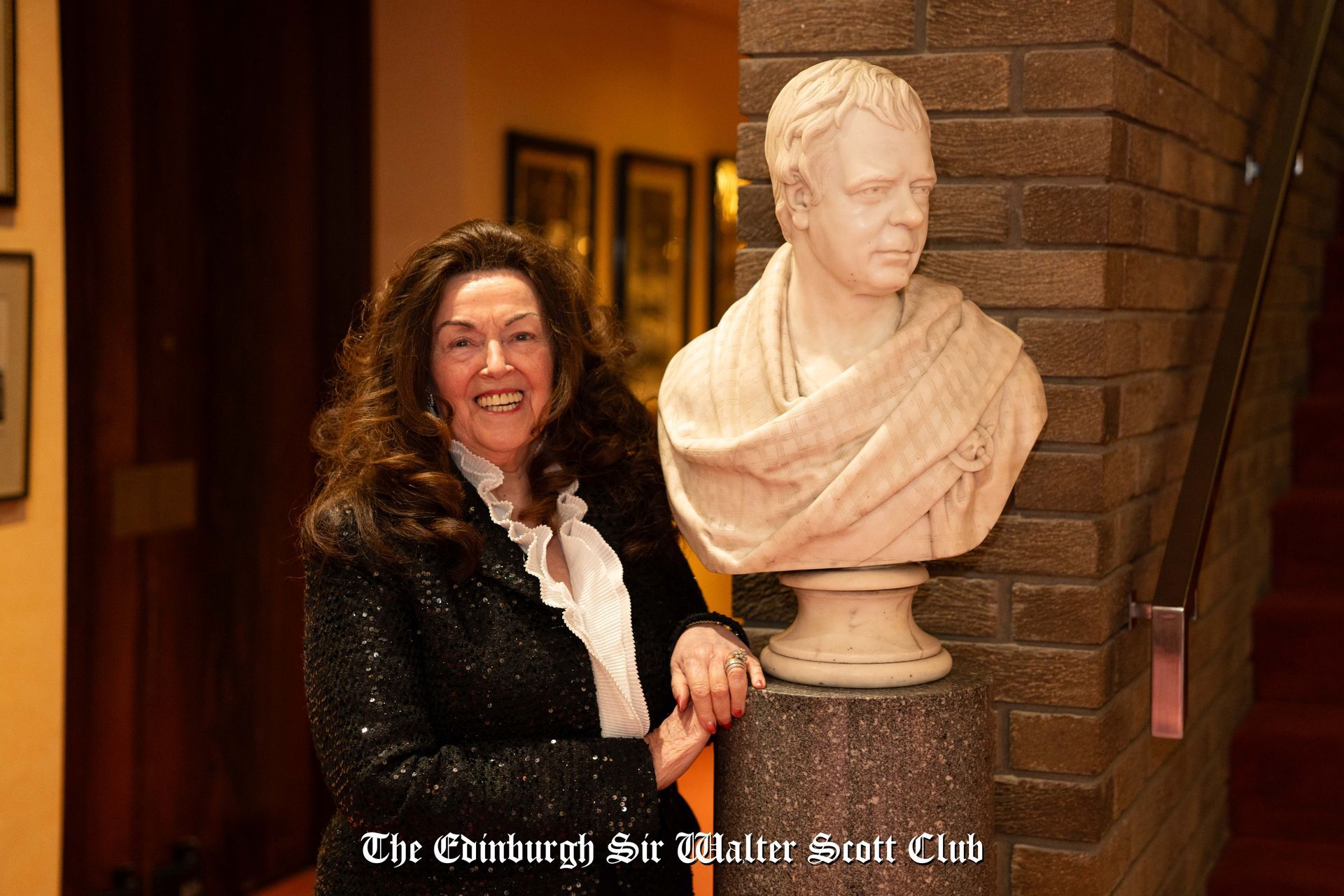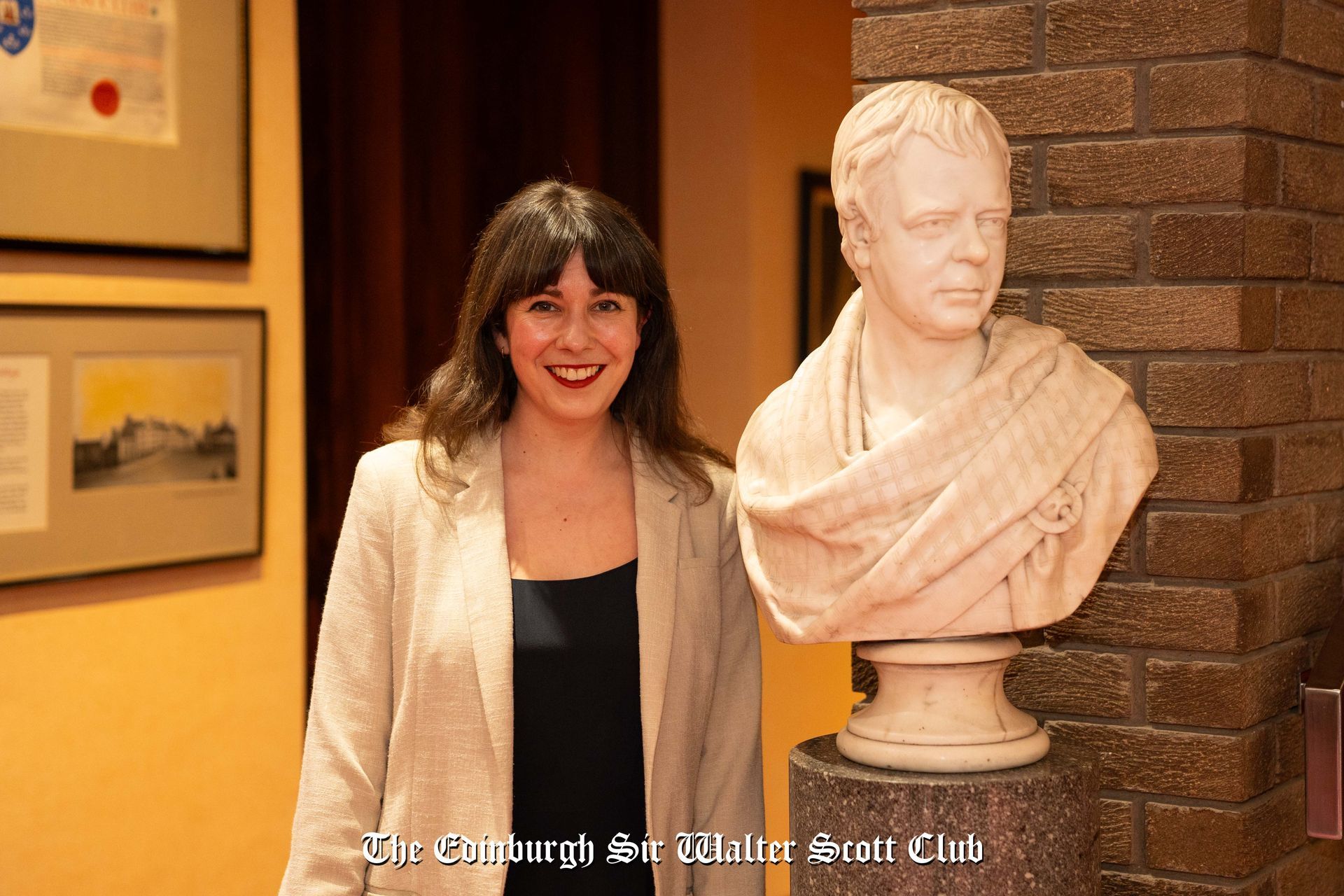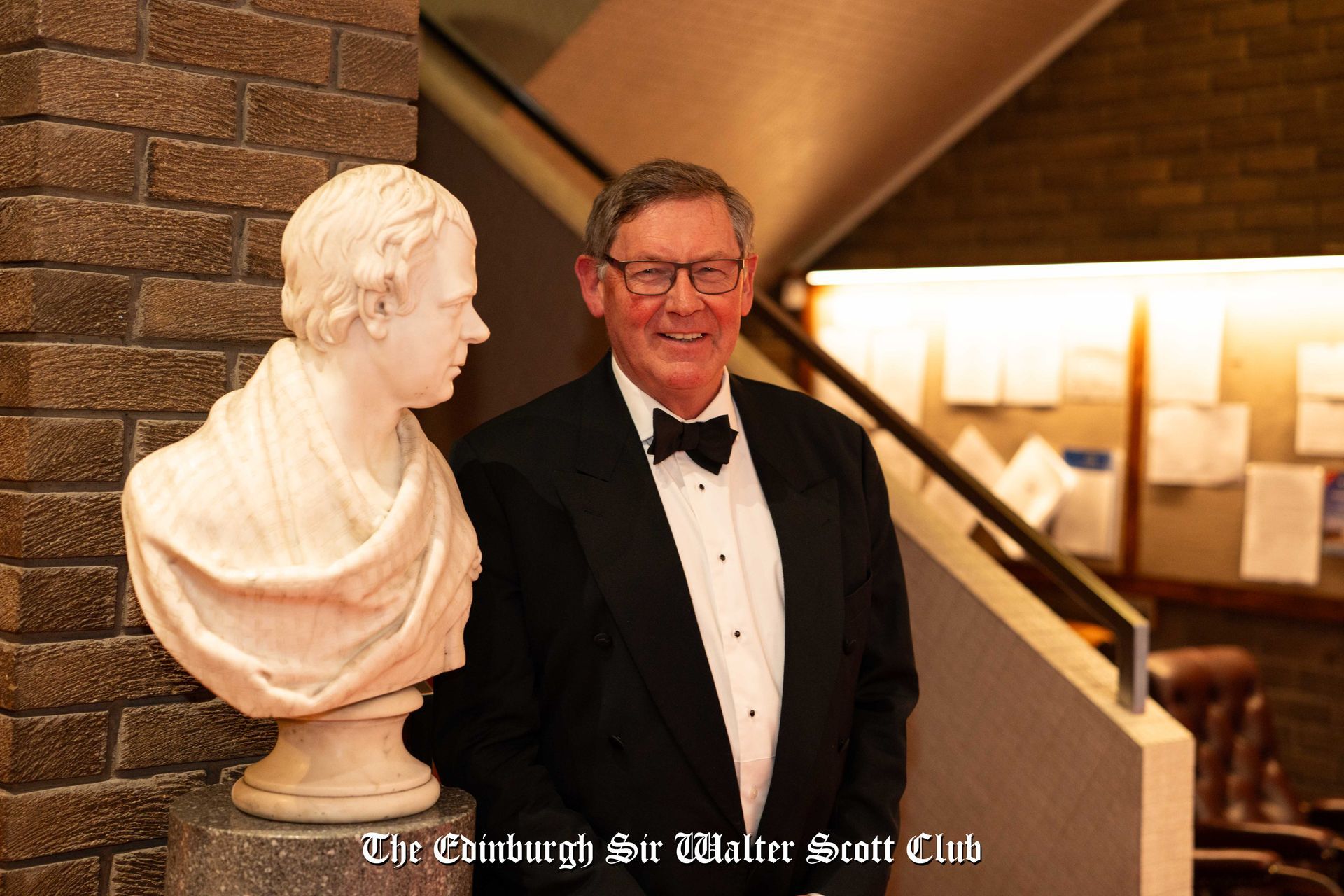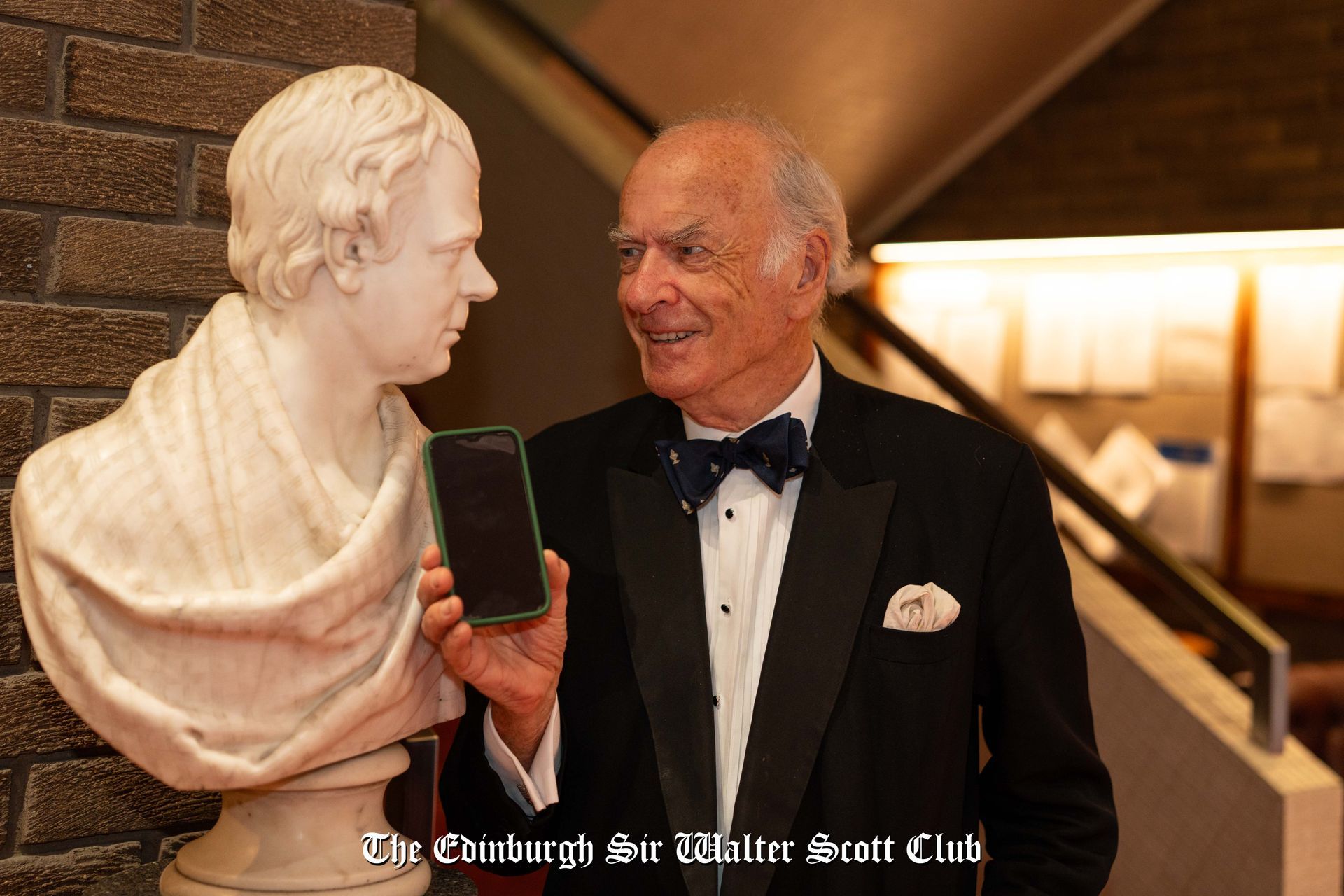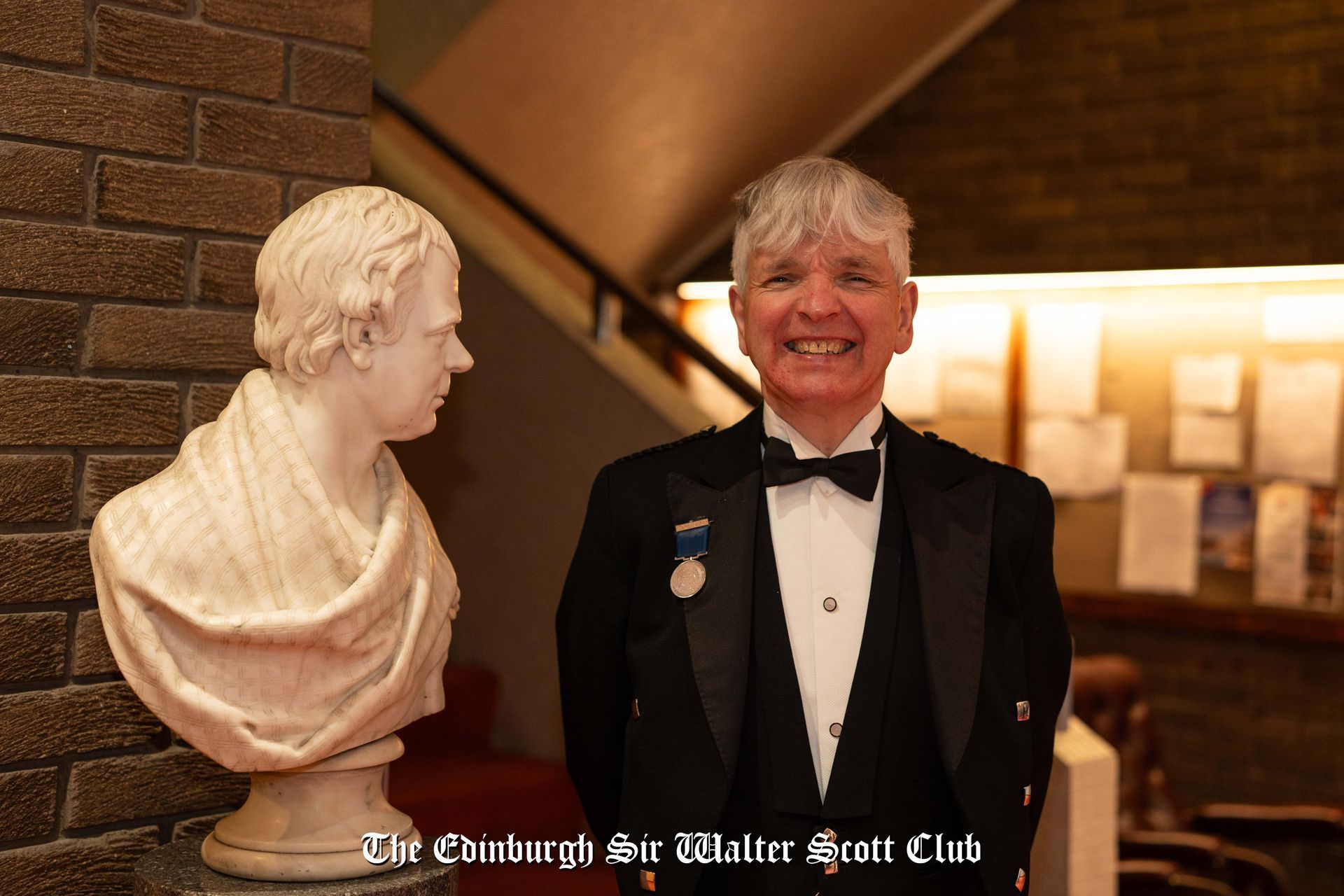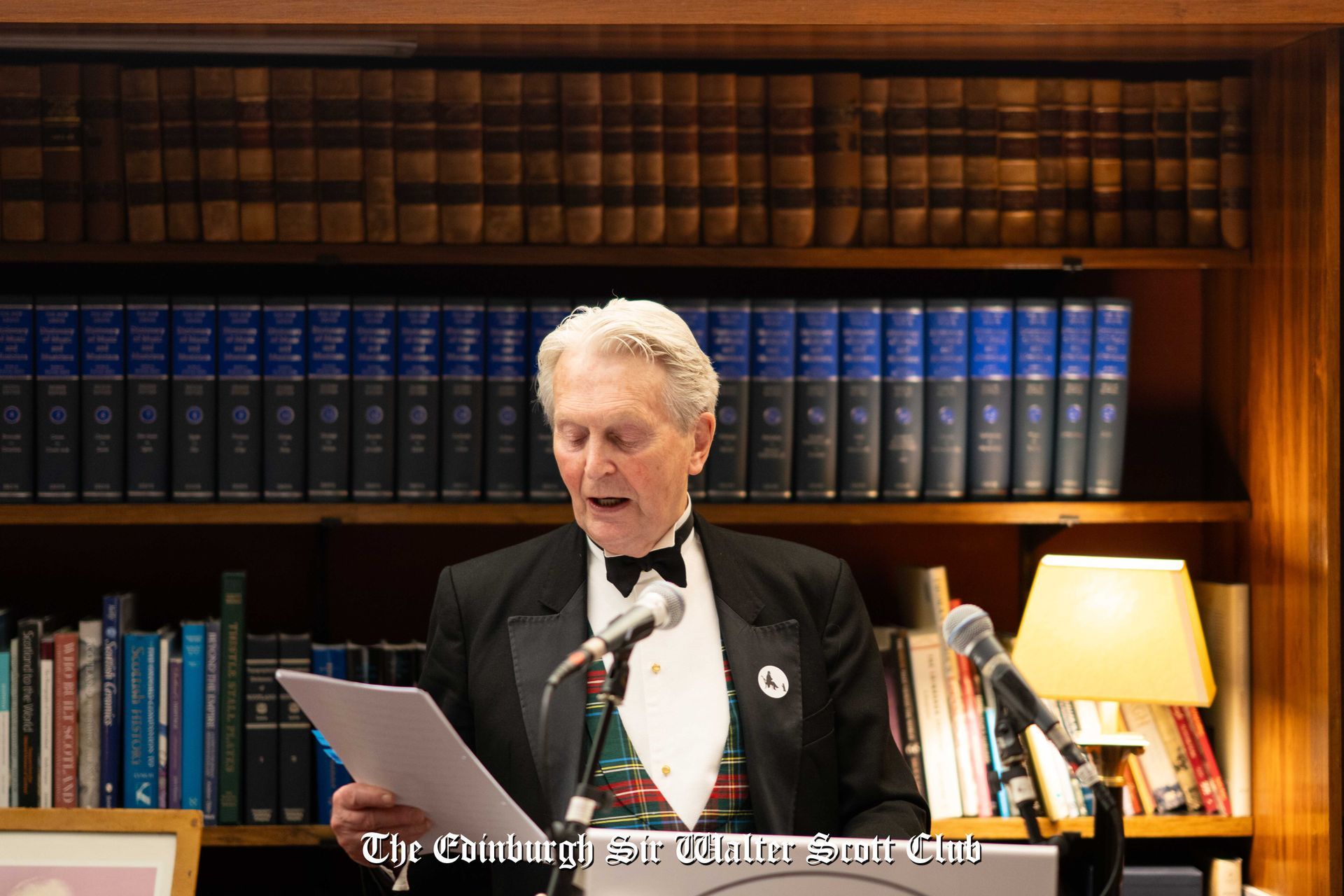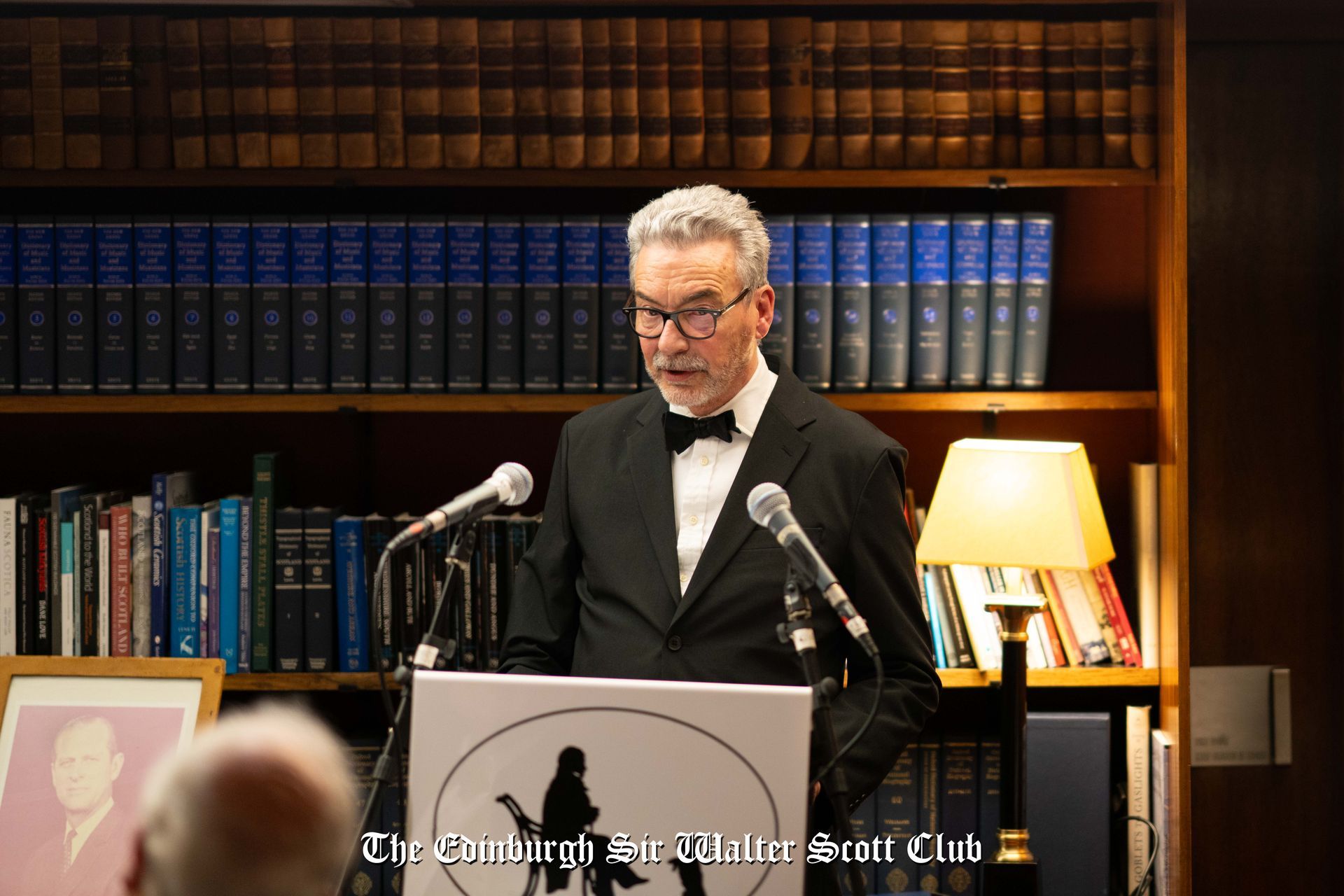2024
Our President for 2024/5 was:
Lord Stewart
He proposed the Toast to Sir Walter at our 115th Annual Dinner on 1st May 2025.
Download the [transcript]
Summary of the Speech:
Lord Stewart's Toast to Sir Walter Scott focuses particularly on a lesser-known location in the Western Highlands called Invernenty, which is significant in Scott’s novel, Rob Roy. He explores personal connections to the place, sparked by interactions with Jane Baker, a descendant of Donald McLaren, and the late Lady Sybil Stewart, known as 'Chibi', a remarkable figure who had participated in wartime missions in Yugoslavia.
Lord Stewart recounts the eviction of the tenants from their land at Invernenty, orchestrated by Sir Walter Scott's father due to debts owed by Dougal Stewart, Chief of Appin. The story includes Donald McLaren's dramatic escape from custody after the 1745 Jacobite Rising. Sir Walter Scott creatively adapted these historical events into his fiction, notably in Rob Roy and Redgauntlet, adding literary significance and blending reality with imagination.
The speech delves into disputes over historical representation, such as disagreements over commemorative markers at Culloden battlefield between the Stewart and McLaren clans, highlighting the complexities and controversies in Scottish historical memory.
Lord Stewart speculates on Scott’s reasons for embellishing historical facts, suggesting it was partly patriotic rivalry with English poet William Wordsworth, to reinforce Scotland's cultural heritage.
The speech ultimately celebrates Scott’s literary genius and his enduring influence on Scotland’s cultural identity, noting his contributions to unifying the nation through shared, albeit romanticised, historical memories.
Interesting Points:
- The speech centres on Invernenty, a real Highland location that inspired parts of Rob Roy.
- Donald McLaren of Invernenty historically linked to the 1745 Jacobite Rising.
- Walter Scott became involved with Invernenty through a legal case during his apprenticeship, representing his father's interests in reclaiming debt.
- Scott later romanticised this involvement in his literary works, blending fact and fiction.
- The eviction of Invernenty was apparently peaceful and did not involve military force, despite Scott’s dramatized account.
- The Culloden battlefield marker controversy involved historical disputes about the McLarens' role — not supported by evidence.
- Scott’s narratives helped forge a national identity, blending myth and memory, and presenting a unifying vision of Scottish history.
- His journey to Invernenty ultimately inspired the poem The Lady of the Lake, which led to the historical novel Waverley.
- Historical Myths vs. Documentary Reality: The speech smartly illustrates how Scott, knowingly or not, reshaped historical events to suit his literary and national purposes.
- Personal Connection: Lord Stewart’s connection to the legal case involving Scott’s father adds depth — this isn’t just history, it’s personal, layered, and lived.
- Role of Women in History: Lady Sybil (“Chibi”) Stewart’s WWII heroism and role in historical preservation stood out dramatically — a reminder of overlooked but formidable female contributions.
- Literary Spark: A legal eviction case inspired a masterpiece — an example of how mundane events can transform into cultural milestones.
- Scott as Nation-Builder: The speech makes a compelling case that Scott’s greatest legacy may be his ability to turn Scotland’s fractured past into a positive, collective identity through fiction.
Download the [transcript]
List of Members Present
On Thursday 1st May 2025, the Annual Dinner of the Club took place in the New Club, Edinburgh. Dr. Lucy Wood (Chairperson) presided over a company of 40+ members and guests:
William Agnew, Prof. Margaret Bennett, Ian Chisholm, Lady Caplan, Dr Clement Godbarge PhD, Iain Gardiner, Louise Gardiner, Prof. Peter Garside, Gillian Garside, Dr. Marion Gilmore, Kristina Fulton, John Fulton, Edward Hocknell, James Hardie, Kath Hardie, Rosaleen Harley, Hugh Lockhart, Very Rev. Allan MacLean of Dochgarroch, Ian McLennan, David McClay (Hon. Secretary), Tom Murison, Dr. Gonzalo Mazzei, Madeleine Mackenzie, Dr. Robert Pirrie WS, Prof. David Purdie, Janet Reid, Walter Reid, Christina Sentence, Joseph Sentence, Lee Simpson (Hon. Treasurer), Lady Stewart, Flora Stewart, Lord Stewart, Patrick Stewart CVO, Rhoddie Stewart-Meiklejohn, Paul Sweetnam, Krystyna Szumelukowa, Prof. Sir Iain Torrance KCVO Kt FRSE, Morag Torrance, Michael Turpie, Lisa Watson, Tom Watson, Eric Wishart
Angus Stewart,
the Honourable Lord Stewart, was a Senator of the College of Justice 2010—2017. He practised as an advocate 1975—2010 and served as Keeper of the Advocates Library 1995—2002. In that role he was inaugural Chair of the Faculty of Advocates Abbotsford Library Project. His interest in Scott began at school where he won the
Sir Walter Scott Club Essay Prize. He has published books, contributions and articles on law, eighteenth century legal history, Jacobite history and on Scott, Stevenson and Barrie. His most recent article,
“Sir Walter Scott: Law and Imagination”, offers new information about Scott’s novels
Redgauntlet, The Bride of Lammermoor, Anne of Geierstein and Rob Roy.
See all of the [photos]
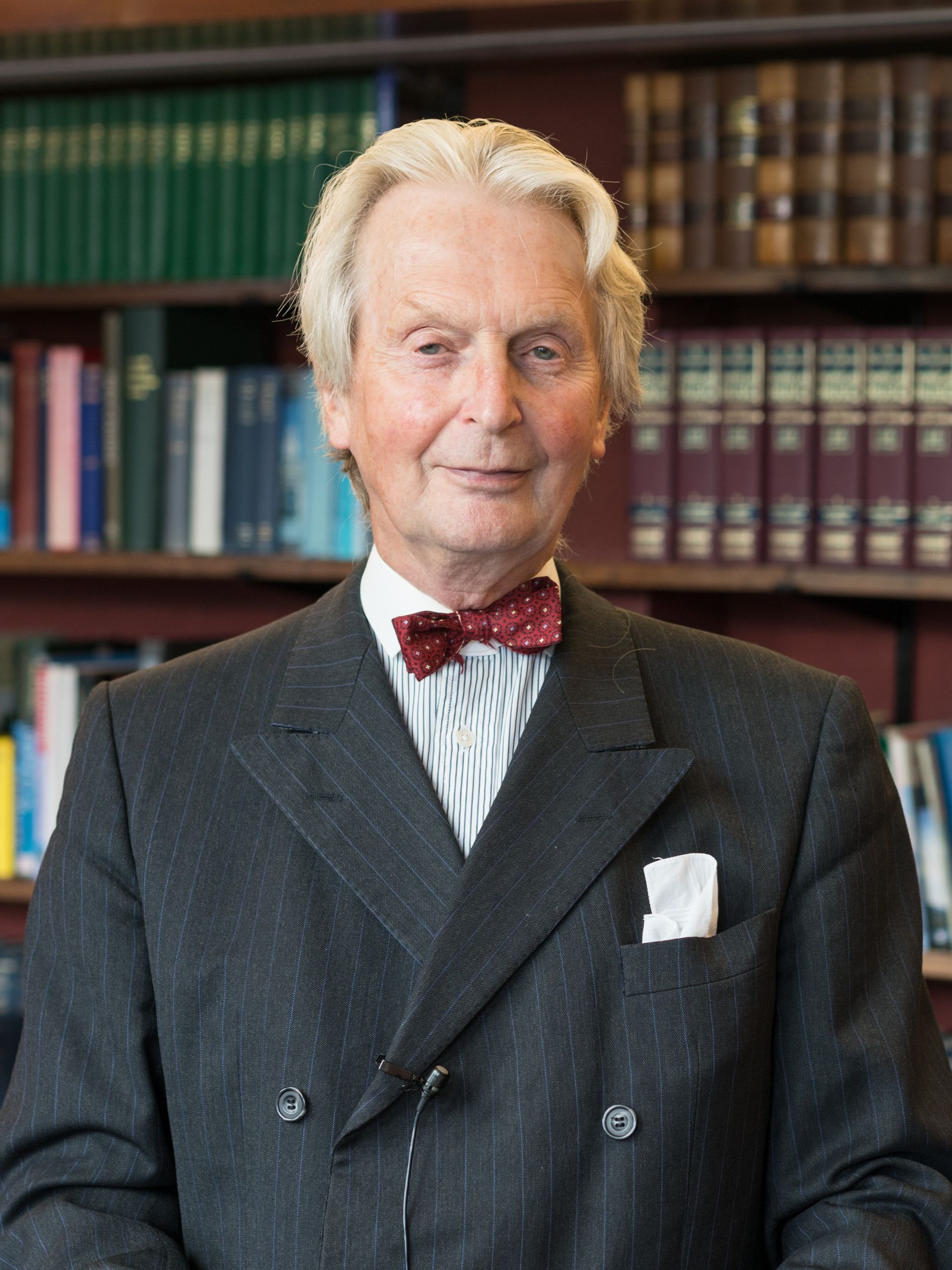
Subsidiary Toast Summary:
Dr. Lucy Wood offered a toast celebrating Walter Scott's legal roots as the son of a Writer to the Signet, tracing how his legal background informed and enriched his literary career. She highlighted Scott’s youthful experiences in Enlightenment Edinburgh and the rituals of legal society, such as the daily meridian dram.
Dr. Robert Pirrie responded with a personal reflection on his journey from corporate law to literary historian, revealing how his appreciation for Scott deepened after joining the WS Society. He defended Scott’s historical authenticity, criticised modern misconceptions about his legacy, and invited greater public engagement with his work and the Signet Library.
Interesting Points
- Scott’s apprenticeship was disrupted by growth spurts and an odd prescription of vegetarianism.
- The meridian dram tradition among Writers to the Signet adds colour to the image of legal Edinburgh.
- Dr. Pirrie owns multiple editions of Scott’s novels—including the Border Edition, red-bound with Japanese paper.
- He challenges academic claims that Scott created a “mythical” Scotland, seeing instead historical precision.
- The Signet Library holds many original Scott treasures and is open to visitors from the Walter Scott Club.
Download the [Subsidiary Toast] to read the Reply in full.
Dr. Lucy Wood – Toast to the Society of Writers to His Majesty’s Signet
When we think of Scott, we often think of the word writer, but tonight we are reminded that his professional identity was not initially literary but legal. Scott was born into a legal family—not just any lawyer, but a Writer to the Signet. He began studying at the University of Edinburgh at age 12 and was apprenticed to his father's legal office at 15. His apprenticeship was occasionally disrupted by growth spurts, one of which prompted a doctor to prescribe vegetarianism, much to Scott’s dismay.
While the legal world may seem stern, Enlightenment Edinburgh was alive with social and intellectual energy. The legal quarter, particularly Parliament House, was surrounded by inns and taverns frequented by philosophers, lawyers, and writers. Scott would have been immersed in this lively culture.
One notable anecdote, drawn from Redgauntlet, recounts how Writers to the Signet and clerks would make a daily visit to John’s Coffee House for the meridian—a midday dram of brandy. Though they often didn’t speak, the shared ritual was a form of sociability. Amusingly, the coffee house has recently reopened.
Though Scott's path led him to literature, his legal grounding remained with him. He was called to the bar in 1792 and practised for thirty years. The law profoundly influenced his fiction, imbuing it with themes of justice, social order, and historical realism. From The Heart of Midlothian to Redgauntlet and Guy Mannering, Scott’s legal world enriched his writing.
It is no coincidence that the son of a Writer to the Signet became a writer of such stature. So, if not with a bumper dram of brandy, at least with whatever is in your glass—let us raise it to the Society of Writers to His Majesty’s Signet.
Vote of Thanks:
Ian Chisholm gave a heartfelt vote of thanks acknowledging the hospitality of the New Club and the insightful contributions of speakers Angus and Robert. The speaker reflects on their early introduction to Walter Scott’s Tales of a Grandfather, noting how it shaped a lifelong passion for history and the importance of recognising its complexity. The address warns against the politicisation of history and underscores the shared duty to pursue and communicate historical truth. The evening is praised as enriching and convivial.
Notable & Interesting Points
- Personal Reflection: The speaker’s early engagement with Tales of a Grandfather offers a poignant touch, especially in recognising Scott’s own attempts to correct historical narratives.
- Faulkner Quote: “The past is not dead. It is not even past.” This adds literary depth and connects the evening’s theme to broader cultural currents.
- Contemporary Relevance: The warning about history being "weaponised" in current events (e.g. Brexit, Putin, Trump) gives the speech modern urgency and significance.
- Call to Integrity: There's a compelling appeal to those who care about history to continue fighting for truth and complexity against oversimplification.
Grace:
The sky has fallen - unprecedented and unexpected,
Biology is exactly as we had suspected.
We shrink to say what we may think,
Lest Yvette Cooper put us in the clink.
Rachael Reeves, from all accounts,
Is paralysed to watch her credibility bounce.
All is not lost - Witty, fair, always expressive,
Giorgia Meloni is greatly impressive.
How we wish she were eligible for Pope,
Universal rejoicing would welcome white smoke.
We cannot tax more, Laffer’s curve bites,
Borrowing is maxed, the bond market hikes.
A crisis of debt - we thank God for Sir Walter,
No DOGE needed here, no one should falter,
My own right hand will carry this load
The Honourable Lord Stewart will show us the road.
And finally, before we dine,
We thank God for all this good food and wine.
-- Prof. Sir Iain Torrance KCVO Kt FRSE


